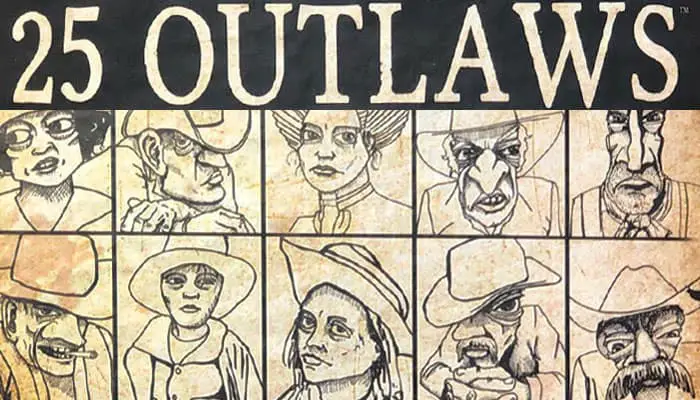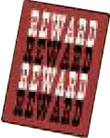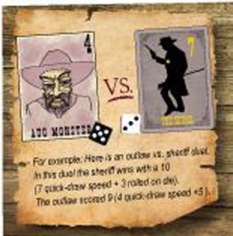
Components

- 25 Outlaw cards
- 20 Old West Poker cards
- 75 $10 poker chips
- 15 $50 poker chips
- 25 Reward cards
- 10 Sheriff cards
- 5 Players reference cards
- 5 Poker Hand Markers
- 2 Dice for duels
- 1 Bank card
- Game Instructions.
Setup
-
First, Each Player Sets Up Their Own Gang Of Outlaws Yee-haw!
-
Choose 1 colored set of 5 Outlaws. This will be your gang.
-
You will only need 3 of the 5 Outlaws to play. Shuffle all 5 facedown, and without looking, randomly discard 2 of them back into the game box.
-

Look at your 3 remaining Outlaws, but Do not reveal the identity of your Outlaws to other players.
Take note of the quick-draw speed for each Outlaw in your gang (it's the number in the comer) - this will be key when you duel other Outlaws.
-
Place your Outlaws face-down in a row in front of you - order does not matter. You may look at the cards at any point to remember each Outlaw's quick-draw speed.
-
Each Outlaw begins the game with $100.

Place five $10 chips and one $50 chip by each Outlaw card Extra poker chips are kept in the box.
-
The 3 Outlaws in each gang will take turns playing the poker hands. Place a Poker Hand Marker on your far-right Outlaw card.
This signifies which Outlaw is playing in the current poker hand.
-
-

Put the bank card on the table this is the bank for the game
-
Shuffle each deck of sheriff, reward, and wanted cards separately, and place each deck face-down on the table.
-
Players will take turns as the dealer. The dealer hosts each round of poker and then has the option to hold up opponents later in the round.
-
Roll a die to determine who deals first. The highest number wins.
Game Play
"25 Outlaws" is played in a series of rounds. Each round is played in the following order:
1. Play Poker

Each round begins with a hand of Old West 3-Card Poker using standard poker rules There arc only 20 cards in the deck - a 10. Jack. Queen. King, and Ace in each of the 4 suits.
Win money to stay in the game. May the best hand - tit the best-bluffed hand - win! Here's how you play Old West Poker...
-

Identify Your Outlaw for the Round - The Outlaw with the marker is the one playing in the current poker hand. They must have at least $100 to play the hand.
-
Everybody Antes - Each poker hand starts with a mandatory $10 ante. Each Outlaw with the marker must play in the hand. No sitting out. Each player takes $10 from their active Outlaw and places it in the center of the table. This is called the Pot.
(In later rounds, the ante increases $10 whenever a gang is eliminated from the game).
-
Deal Cards - The Dealer shuffles the poker cards and deals 2 to each player.
Then 1 card es dealt face-up on the center of the table. This card is called the Flop Card, which is a communal card for all players to complete their three-card hand.
('After the first round, the Flop Card may trigger a Sheriff, but well get to that later). It's standard poker rules from here on out. The winner of the hand takes the Pot of money and places it on thor active Outlaw tor the round
2. Buy Reward Cards

After each poker hand, all players have the option to buy one Reward card to give one of their Outlaws a special advantage. Rewards are $30 each.
Rewards may be purchased by any Outlaw, but only one Reward is allowed per Outlaw at a time.
To purchase, take $30 from the Outlaw buying the Reward and place rt in the Bank You cannot redistribute money to cover the cost. Draw a Reward and place it on the Outlaw that paid for it.
Revealing the Reward before rt is played is optional. Rewards can be played anytime by any player - even immediately When played, they must be revealed to all players.
A Reward cannot be moved to other Outlaws during the game.
After a Reward is used, it is shuffled back into the deck.
3. Holdups
It's the Dealer's table, and they have the option to rob another Outlaw with a Holdup.
This is just as strategic as the poker hand. Use your quick-draw speed, wits. and Reward cards to strong-arm, bluff, and duel other Outlaws into handing over their money.
There may only be 1 Holdup per round.
If the Dealer passes, the round is over, and the players start the next round.
Rules For a Holdup
The Dealer may use any Outlaw in their gang to hold up any Outlaw in another player's gang. Holdups are not confined to the Outlaws that participated in the poker hand.
When the Dealer announces their attacking Outlaw and v/ho they want to hold up. the defending Outlaw has 2 options:
-
They Fight Back
They fight back and duel the attacker to keep their money. Only 1 Outlaw will survive!
When the 2 Outlaws duel, the losing Outlaw is out of the game, and that Outlaw card is discarded into the box.
Any money on that card goes to the winning Outlaw. Any Wanted or Reward cards that were on the losing Outlaw are shuffled back into their decks
Or
-
They Cower
They are a yellow-belly and don't want to risk losing their Outlaw. So. they cower and give half of their Outlaw's money to the attacking Outlaw If you can't divide the money evenly, just round up.
One exception: If the defending Outlaw has $30 or less, they must duel, and cowering is not an option.
Holdup hint for the attacker: If your Outlaw card has not been revealed, try bluffing your quick-draw speed to get your opponent to cower.
4. Wanted Cards

When any Outlaw holds up another Outlaw they become wanted by the law. They must draw a Wanted card (unless they were killed in the duel).
The Wanted card is placed face-up on the Outlaw. This signifies that a Sheriff ts looking for them and may come into play during a poker hand.
Wanted cards are labeled as 10 Jack, Queen, King, and Ace. They are not suited specifically.

An Outlaw may have multiple Wanted cards -1 Wanted card for each Holdup that the Outlaw has committed.
The round is now over, so it's time to cool your spurs, redistribute your gang's money, and start the next round!
How to Duel

Duels occur between two Outlaws or between an Outlaw and a Sheriff.
Both cards are flipped over to reveal who is dueling and what their quick-draw speeds are. The higher the number on the card, the faster they are.
Once an Outlaw is flipped over, it remains face-up for the remainder of the game
Now. each player rolls a die. If a Sheriff is in the duel, any opposing player rolls for a Sheriff.
Each player adds the number of their die roll to the quick-draw number on the< card
Any additional modifiers from Reward cards are also added to - or subtracted from - that number The player with the highest number wins the duel!
If there is a tie - both players roll again until there Is a higher number. Any Reward cards used in a duel are shuffled back into the deck.
Starting the Next Round
The role of Dealer moves left to the next player
Each player moves their Poker Hand Marker left to the next Outlaw. Players may redistribute money among the Outlaws within their gang at this time.
Remember: once the poker hand starts, you cannot exchange money between Outlaws until the start of the next round, so plan accordingly.
The Outlaw wth a poker hand marker MUST have a minimum of $100 on it after redistributing money. If you cannot move enough money from your other Outlaws to reach $100, then you are eliminated from the game.
When all players are ready, start the next poker hand.
Sherrifs

A Sherriff may interrupt a poker hand to confront Wanted Outlaws when a Flop Card is dealt.
When a Flop Card is dealt, all players check any Wanted cards on their Outlaws.
If any Outlaw has a Wanted card that matches the number of the Flop Card, that player must draw a Sheriff and place it face-up on the center of the table.

The poker hand pauses, and the Outlaw must duel with the Sheriff.
A different Sheriff is drawn for each matching Wanted card on the table. If there are multiple duels with the Sheriff, duels will take place in the same order as betting.
If the sheriff wins the duel
that Outlaw is out of the game and discarded into the box.
The Sheriff Wanted cards, and any Reward cards on that Outlaw are shuffled back into their decks. Money on that card goes into the Bank.
If the outlaw wins the duel
the Sheriff is discarded into the box.
The Wanted card is removed and shuffled back into the Wanted card deck.
After any Sheriff duels, the poker hand resumes.
If an Outlaw with a marker loses a dud with a Sheriff, that Outlaw is out of the game, and that player cannot participate m the poker hand for the rest of the round
However, they may still buy a Reward later in the round and have the option to declare a Holdup if they are the Dealer
Player Elimination
Players are eliminated from the game when their gang does not have $100 to start the next round, or if they run out of Outlaws.
When a player doesn't have enough money to start a round, their Outlaws are discarded into the box and any remaining chips are placed in the Bank. Any Reward or Wanted cards that were associated with that gang are shuffled back into the>r decks.
Each time a gang is eliminated, the ante and minimum bet increase $10 in the following round.
End of the Game
As soon as there is only one player left with at least 1 Outlaw and $100, they are the winner!
The game stops immediately - even if the round is not finished The winning player takes their winnings and rides into the sunset!
Continue Reading
